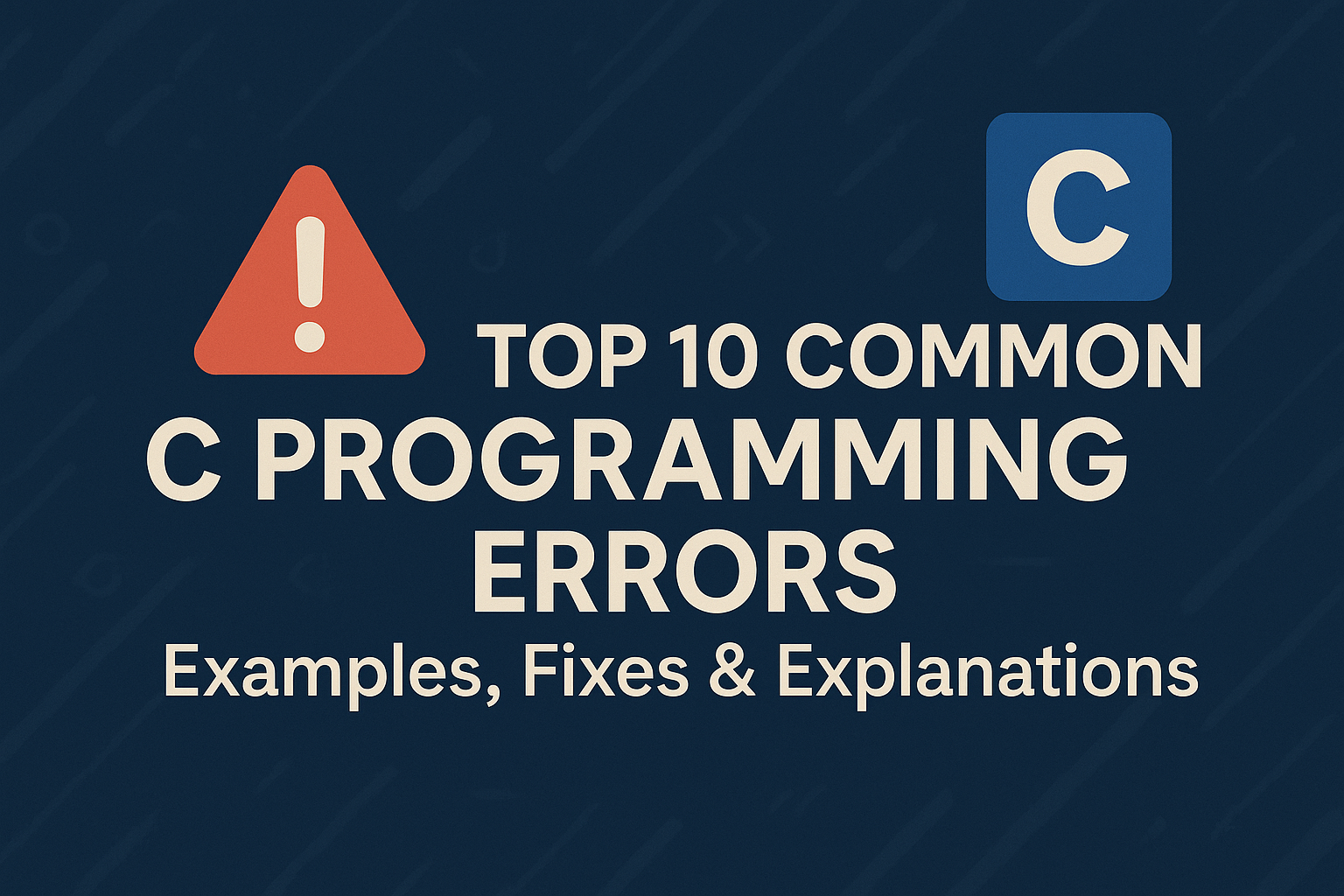Introduction
C programming is widely used in system programming, embedded devices, and software development. While it's powerful, beginners and even experienced developers frequently make small errors that can cause program crashes or unexpected results. Understanding these errors not only improves your coding skills but also enhances your debugging and problem-solving abilities.
In this guide, we will cover the top 10 common C programming errors, explain why they occur, how to fix them, and provide best practices to prevent them in future projects. By the end, you'll also find a comprehensive FAQ to answer all common queries related to C errors.
Top 10 Common C Programming Errors
-
Missing Semicolon
#include <stdio.h> int main() { int number = 42 printf("Number: %d\n", number); return 0; }#include <stdio.h> int main() { int number = 42; // Fixed printf("Number: %d\n", number); return 0; }Explanation: Every statement in C must end with a semicolon. Missing it causes a syntax error. Tip: Always double-check the end of each statement.
-
Undeclared Variable
#include <stdio.h> int main() { sum = 5 + 10; printf("Sum = %d\n", sum); return 0; }#include <stdio.h> int main() { int sum = 5 + 10; // Fixed printf("Sum = %d\n", sum); return 0; }Explanation: All variables must be declared before use. Otherwise, the compiler cannot allocate memory for it.
-
Typo in Variable Name
#include <stdio.h> int main() { int height = 180; printf("Height: %d\n", heigth); return 0; }#include <stdio.h> int main() { int height = 180; printf("Height: %d\n", height); // Fixed return 0; }Explanation: Variable names are case-sensitive. Typos will cause compile-time errors.
-
Wrong Format Specifier for Float
#include <stdio.h> int main() { float price = 19.99; printf("Price: %d\n", price); return 0; }#include <stdio.h> int main() { float price = 19.99; printf("Price: %.2f\n", price); // Fixed return 0; }Explanation: Use
%ffor float/double variables.%dis only for integers. -
Mismatched Braces
#include <stdio.h> int main() { if (1) { printf("Hello\n"); // Missing closing brace }#include <stdio.h> int main() { if (1) { printf("Hello\n"); } // Fixed }Explanation: Every opening
{must have a closing}. Use proper indentation to spot missing braces easily. -
Wrong Return Type for main
#include <stdio.h> void main() { printf("Running...\n"); return 0; }#include <stdio.h> int main() { printf("Running...\n"); return 0; // Fixed }Explanation: Standard C requires
mainto returnint. Returningvoidis non-standard. -
Extra Comma in Declaration
#include <stdio.h> int main() { int a, b,; a = 2; b = 3; printf("Sum = %d\n", a+b); return 0; }#include <stdio.h> int main() { int a, b; // Fixed a = 2; b = 3; printf("Sum = %d\n", a+b); return 0; }Explanation: Extra commas are syntax errors. Always check variable lists.
-
Missing Closing Quote
#include <stdio.h> int main() { printf("Hello World); return 0; }#include <stdio.h> int main() { printf("Hello World"); // Fixed return 0; }Explanation: Strings must start and end with double quotes. Forgetting one causes a compile error.
-
Using Variable Before Initialization
#include <stdio.h> int main() { int x; printf("%d\n", x); // x uninitialized return 0; }#include <stdio.h> int main() { int x = 10; // Initialized printf("%d\n", x); return 0; }Explanation: Uninitialized variables can contain garbage values. Always assign a value before using.
-
Array Index Out of Bounds
#include <stdio.h> int main() { int arr[3] = {1,2,3}; printf("%d\n", arr[3]); // Invalid index return 0; }#include <stdio.h> int main() { int arr[3] = {1,2,3}; printf("%d\n", arr[2]); // Fixed return 0; }Explanation: Array indices start at 0. Accessing beyond declared size leads to undefined behavior.
Best Practices in C Programming
- Use meaningful variable names to avoid confusion.
- Indent your code properly for readability.
- Comment your code for clarity.
- Initialize variables before use.
- Use compiler warnings to detect potential errors early.
- Test code in small chunks to identify errors quickly.
Debugging Tips
- Use
printf()to track variable values and program flow. - Use IDE debugging tools like breakpoints and watch variables.
- Read compiler error messages carefully—they often indicate the exact problem.
- Consult documentation for functions and libraries.
FAQs
1. What is the most common C programming error?
Missing semicolons and undeclared variables are among the most common errors for beginners.
2. How can I avoid syntax errors in C?
Write code carefully, check semicolons, braces, and quotes, and use an IDE or compiler warnings to detect mistakes.
3. Why am I getting a segmentation fault?
Segmentation faults usually occur when accessing memory you shouldn’t, such as out-of-bounds arrays or dereferencing null pointers.
4. Can wrong format specifiers crash my program?
Yes. Using the wrong format specifier can print incorrect values or even cause undefined behavior.
5. What’s the difference between compile-time and runtime errors?
Compile-time errors occur when the code violates syntax or type rules. Runtime errors occur while the program runs, like division by zero.
6. Are logical errors the same as syntax errors?
No. Logical errors compile successfully but produce wrong results. Syntax errors prevent compilation.
7. How do I fix an array out-of-bounds error?
Check your indices, remember arrays start at 0, and never access beyond the declared size.
8. Is using void main() acceptable?
No. Standard C requires int main() as the entry point of the program.
9. Can compiler warnings help prevent errors?
Yes. Treat warnings seriously; they often indicate potential bugs.
10. Why should I initialize variables?
Uninitialized variables contain garbage values, which can lead to unexpected behavior.
